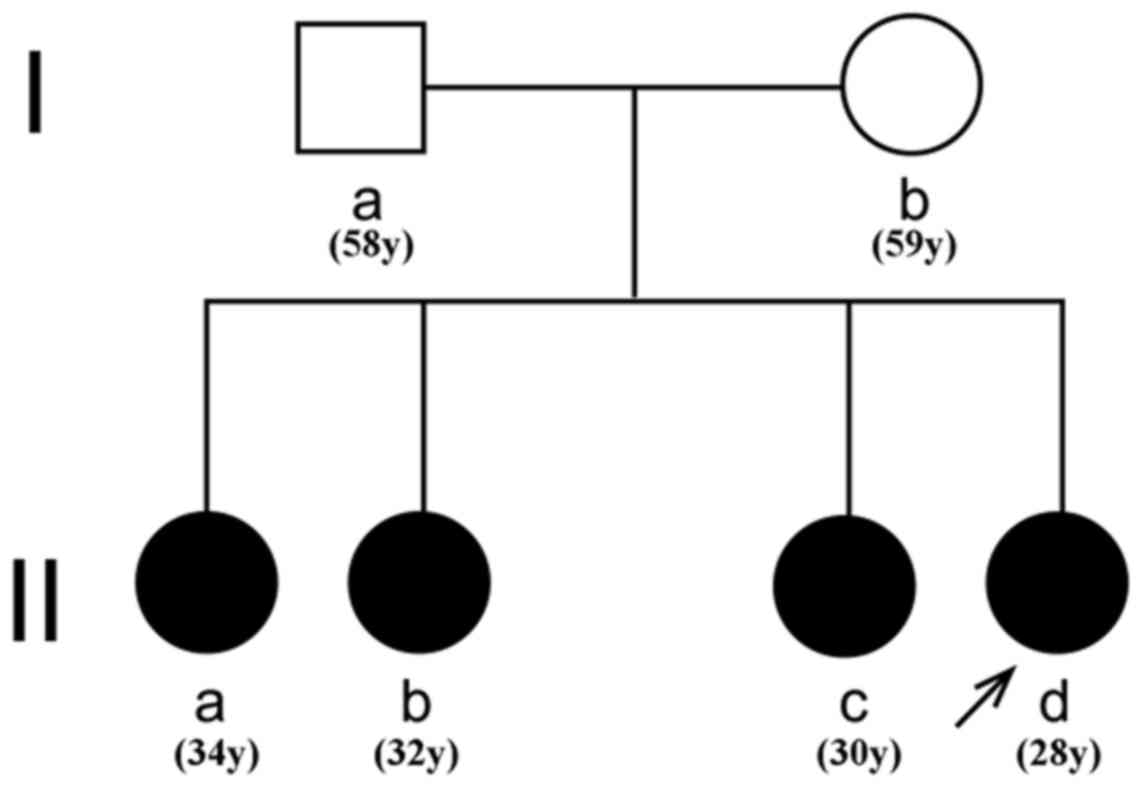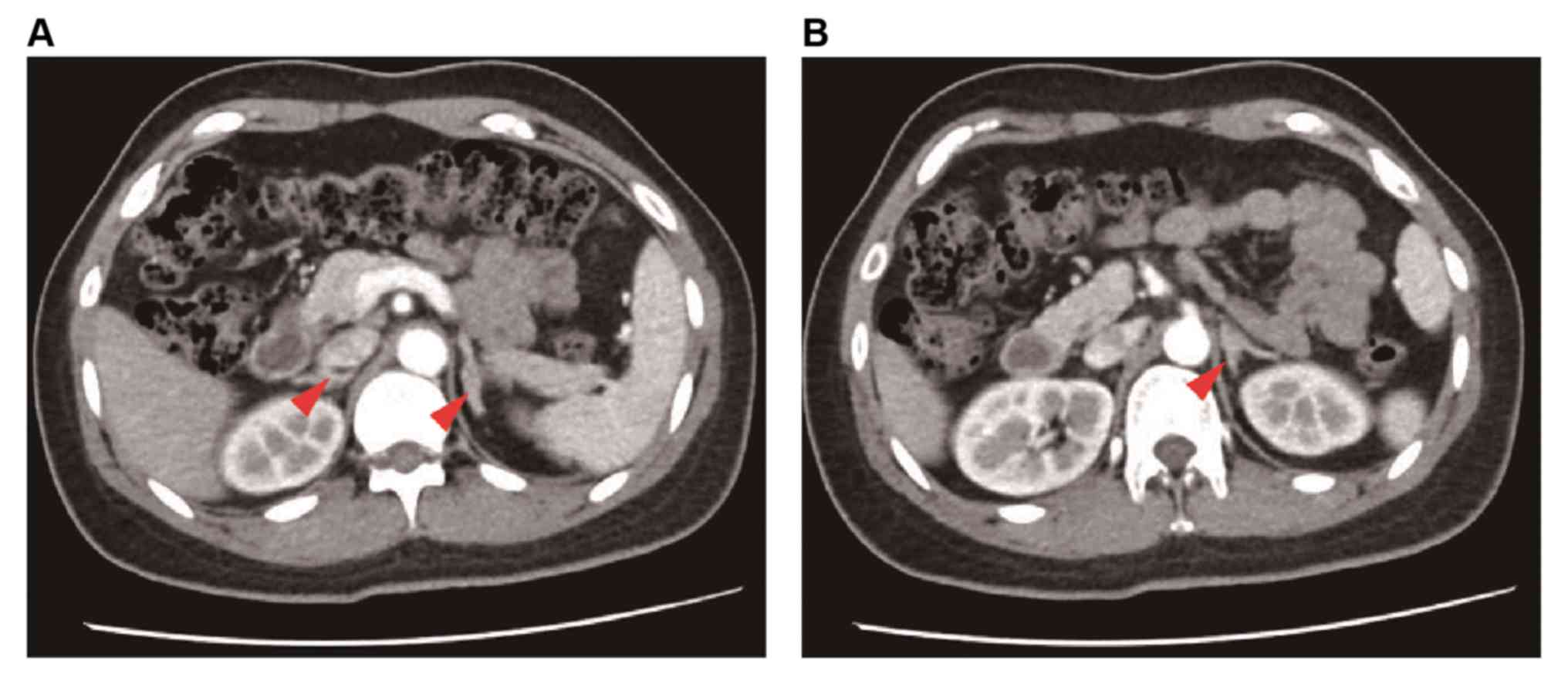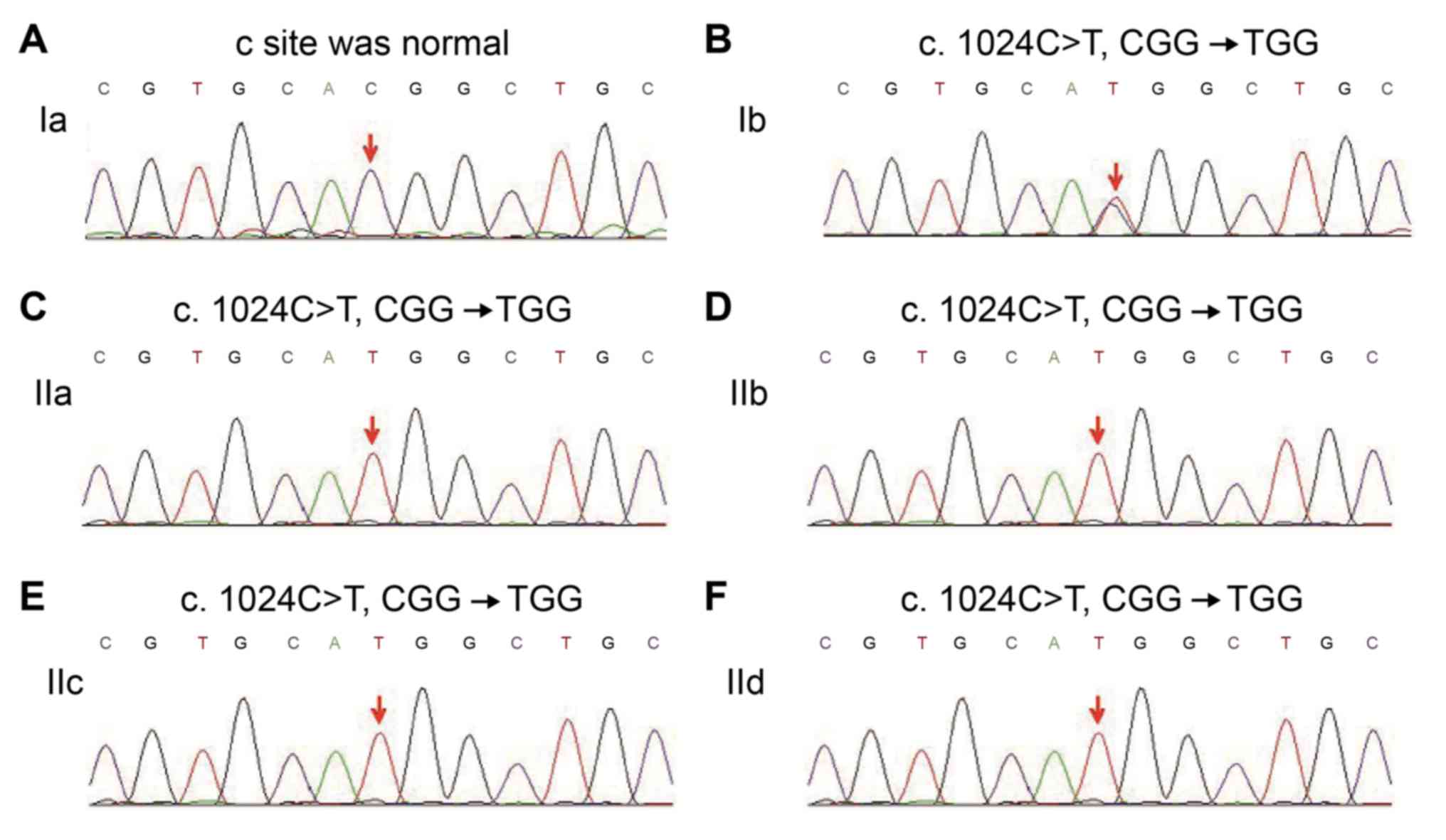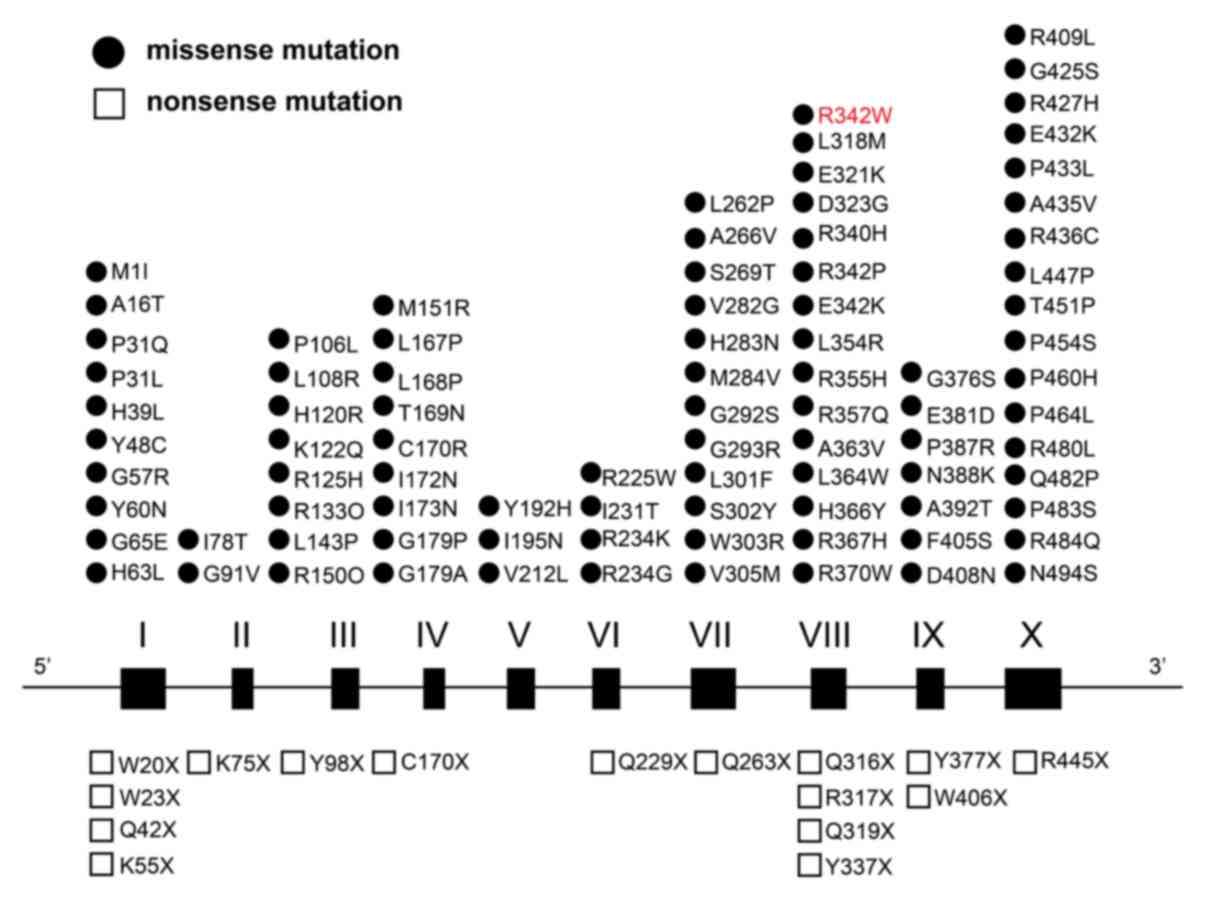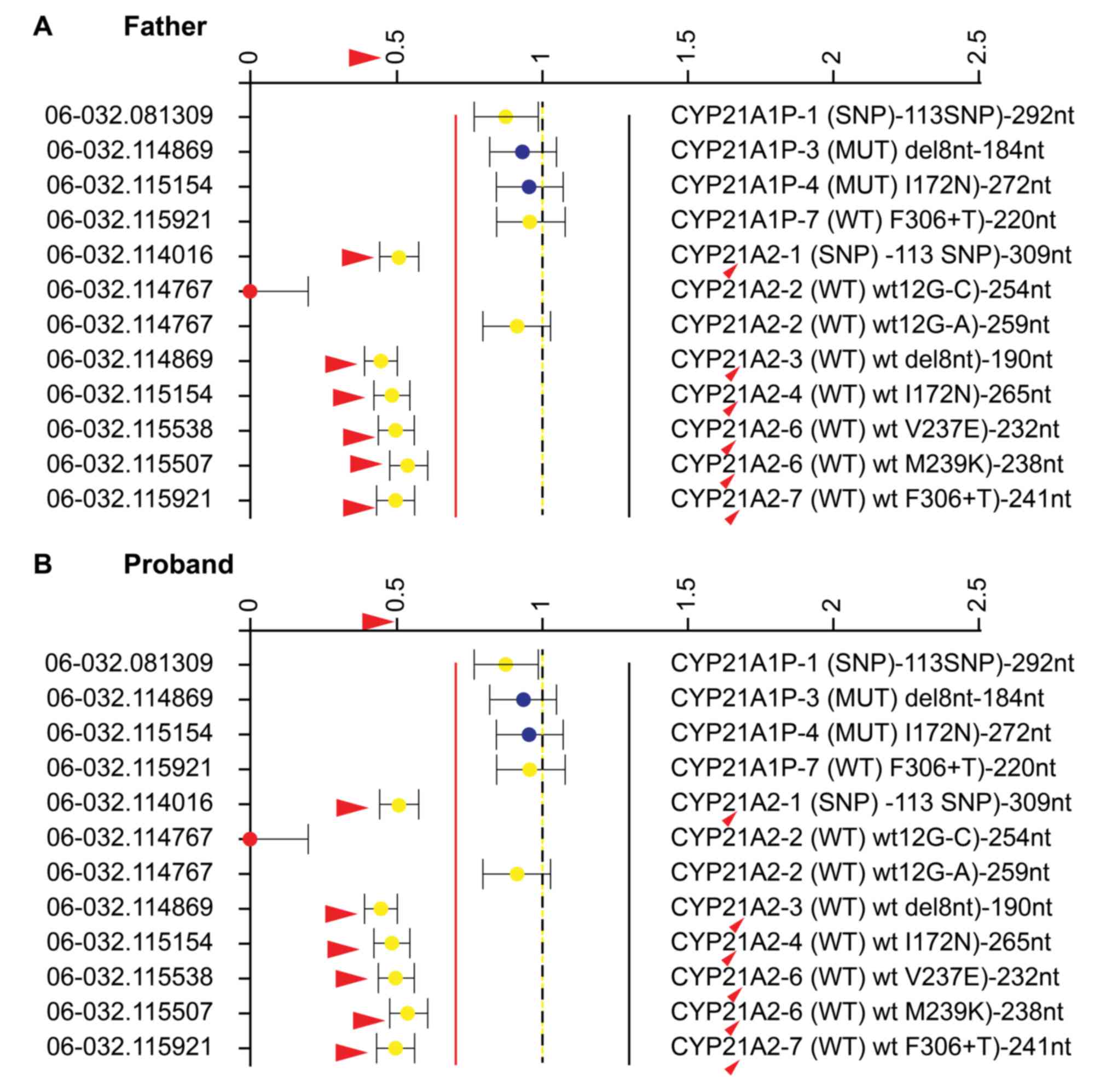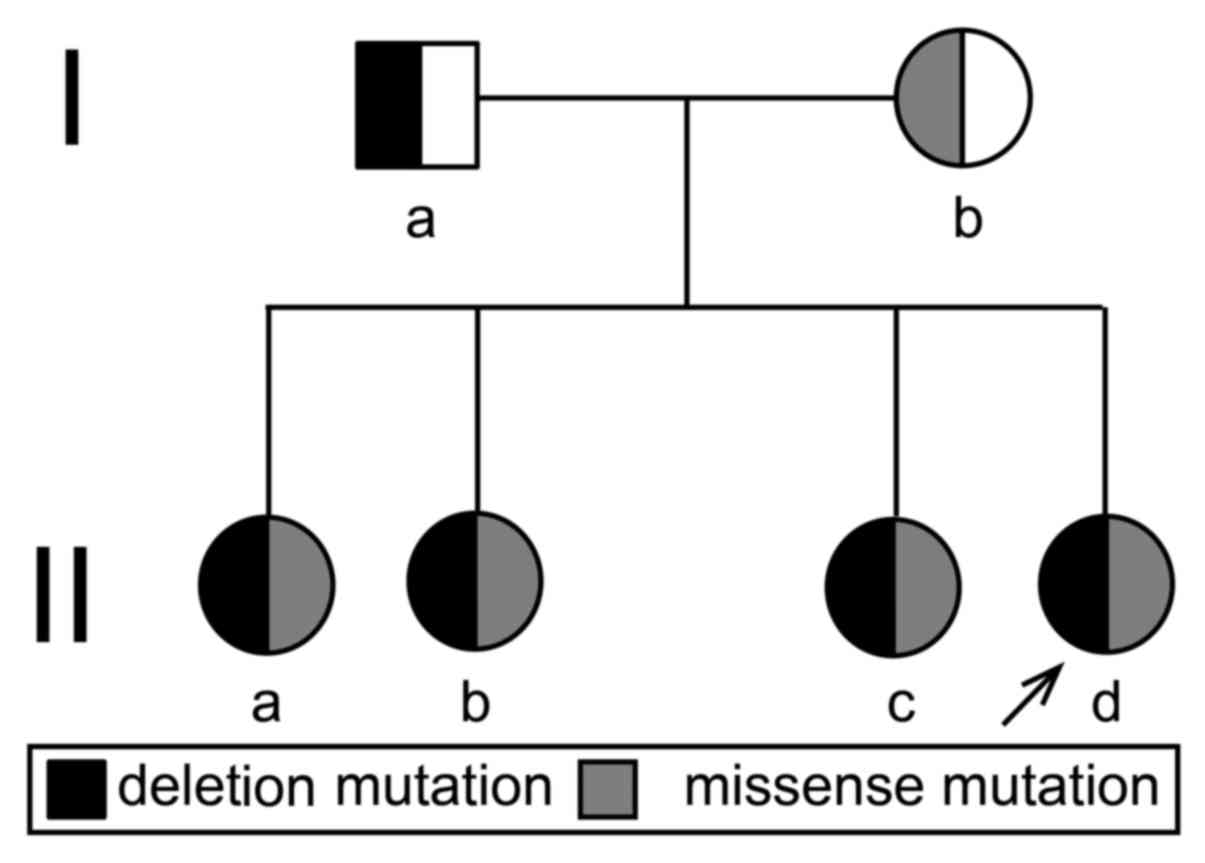|
1
|
Bachelot A, Grouthier V, Courtillot C,
Dulon J and Touraine P: Management of endocrine disease: Congenital
adrenal hyperplasia due to 21-hydroxylase deficiency: Update in
management of adult patients and prenatal treatment. Eur J
Endocrinol. 176:R167–R181. 2017. View Article : Google Scholar : PubMed/NCBI
|
|
2
|
Forest MG: Recent advances in the
diagnosis and management of congenital adrenal hyperplasia due to
21-hydroxylase deficiency. Hum Reprod Update. 10:469–485. 2004.
View Article : Google Scholar : PubMed/NCBI
|
|
3
|
Speiser PW, Azziz R, Baskin LS, Ghizzoni
L, Hensle TW, Merke DP, Meyer-Bahlburg HF, Miller WL, Montori VM,
Oberfield SE, et al: Congenital adrenal hyperplasia due to steroid
21-hydroxylase deficiency: An endocrine society clinical practice
guideline. J Clin Endocrinol Metab. 95:4133–4160. 2010. View Article : Google Scholar : PubMed/NCBI
|
|
4
|
White PC, Grossberger D, Onufer BJ,
Chaplin DD, New MI, Dupont B and Strominger JL: Two genes encoding
steroid 21-hydroxylase are located near the genes encoding the
fourth component of complement in man. Proc Natl Acad Sci USA.
82:pp. 1089–1093. 1985; View Article : Google Scholar : PubMed/NCBI
|
|
5
|
White PC, New MI and Dupont B: Structure
of human steroid 21-hydroxylase genes. Proc Natl Acad Sci USA.
83:pp. 5111–5115. 1986; View Article : Google Scholar : PubMed/NCBI
|
|
6
|
Bruque CD, Delea M, Fernández CS, Orza JV,
Taboas M, Buzzalino N, Espeche LD, Solari A, Luccerini V, Alba L,
et al: Structure-based activity prediction of CYP21A2 stability
variants: A survey of available gene variations. Sci Rep.
6:390822016. View Article : Google Scholar : PubMed/NCBI
|
|
7
|
Lee HH: Mutational analysis of CYP21A2
gene and CYP21A1P pseudogene: Long-range PCR on genomic DNA.
Methods Mol Biol. 1167:275–287. 2014. View Article : Google Scholar : PubMed/NCBI
|
|
8
|
Li C, Zhou X, Han W, Jiang X, Liu J, Fang
L, Wang H, Guan Q, Gao L, Zhao J, et al: Identification of two
novel mutations in SLC12A3 gene in two Chinese pedigrees with
Gitelman syndrome and review of literature. Clin Endocrinol (Oxf).
83:985–993. 2015. View Article : Google Scholar : PubMed/NCBI
|
|
9
|
Menassa R, Tardy V, Despert F,
Bouvattier-Morel C, Brossier JP, Cartigny M and Morel Y: p.H62L, a
rare mutation of the CYP21 gene identified in two forms of
21-hydroxylase deficiency. J Clin Endocrinol Metab. 93:1901–1908.
2008. View Article : Google Scholar : PubMed/NCBI
|
|
10
|
Antonarakis SE: Recommendations for a
nomenclature system for human gene mutations. Nomenclature Working
Group. Hum Mutat. 11:1–3. 1998. View Article : Google Scholar : PubMed/NCBI
|
|
11
|
den Dunnen JT and Antonarakis SE: Mutation
nomenclature extensions and suggestions to describe complex
mutations: A discussion. Hum Mutat. 15:7–12. 2000. View Article : Google Scholar : PubMed/NCBI
|
|
12
|
White PC: Congenital adrenal hyperplasias.
Best Pract Res Clin Endocrinol Metab. 15:17–41. 2001. View Article : Google Scholar : PubMed/NCBI
|
|
13
|
Bánlaki Z, Szabó JA, Szilágyi Á, Patócs A,
Prohászka Z, Füst G and Doleschall M: Intraspecific evolution of
human RCCX copy number variation traced by haplotypes of the
CYP21A2 gene. Genome Biol Evol. 5:98–112. 2013. View Article : Google Scholar : PubMed/NCBI
|
|
14
|
Barbaro M, Soardi FC, Östberg LJ, Persson
B, de Mello MP, Wedell A and Lajic S: In vitro functional studies
of rare CYP21A2 mutations and establishment of an activity gradient
for nonclassic mutations improve phenotype predictions in
congenital adrenal hyperplasia. Clin Endocrinol (Oxf). 82:37–44.
2015. View Article : Google Scholar : PubMed/NCBI
|
|
15
|
Yu Y, Wang J, Huang X, Wang Y, Yang P, Li
J, Tsuei SH, Shen Y and Fu Q: Molecular characterization of 25
Chinese pedigrees with 21-hydroxylase deficiency. Genet Test Mol
Biomarkers. 15:137–142. 2011. View Article : Google Scholar : PubMed/NCBI
|
|
16
|
Coeli FB, Soardi FC, Bernardi RD, de
Araújo M, Paulino LC, Lau IF, Petroli RJ, de Lemos-Marini SH,
Baptista MT, Guerra-Júnior G and de-Mello MP: Novel deletion
alleles carrying CYP21A1P/A2 chimeric genes in Brazilian patients
with 21-hydroxylase deficiency. BMC Med Genet. 11:1042010.
View Article : Google Scholar : PubMed/NCBI
|
|
17
|
Concolino P, Mello E, Zuppi C and
Capoluongo E: Molecular diagnosis of congenital adrenal hyperplasia
due to 21-hydroxylase deficiency: An update of new CYP21A2
mutations. Clin Chem Lab Med. 48:1057–1062. 2010. View Article : Google Scholar : PubMed/NCBI
|
|
18
|
Lee HH, Chao HT, Ng HT and Choo KB: Direct
molecular diagnosis of CYP21 mutations in congenital adrenal
hyperplasia. J Med Genet. 33:371–375. 1996. View Article : Google Scholar : PubMed/NCBI
|
|
19
|
Concolino P, Mello E, Toscano V, Ameglio
F, Zuppi C and Capulongo E: Multiplex ligation-dependent probe
amplification (MLPA) assay for the detection of CYP21A2 gene
deletions/duplications in congenital adrenal hyperplasia: First
technical report. Clin Chim Acta. 402:164–170. 2009. View Article : Google Scholar : PubMed/NCBI
|
|
20
|
White PC, Vitek A, Dupont B and New MI:
Characterization of frequent deletions causing steroid
21-hydroxylase deficiency. Proc Natl Acad Sci USA. 85:pp.
4436–4440. 1988; View Article : Google Scholar : PubMed/NCBI
|
|
21
|
Parajes S, Quinterio C, Domínguez F and
Loidi L: A simple and robust quantitative PCR assay to determine
CYP21A2 gene dose in the diagnosis of 21-hydroxylase deficiency.
Clin Chem. 53:1577–1584. 2007. View Article : Google Scholar : PubMed/NCBI
|
|
22
|
Lee HH, Lee YJ and Lin CY: PCR-based
detection of the CYP21 deletion and TNXA/TNXB hybrid in the RCCX
module. Genomics. 83:944–950. 2004. View Article : Google Scholar : PubMed/NCBI
|
|
23
|
Krone N, Reisch N, Idkowiak J, Dhir V,
Ivison HE, Hughes BA, Rose IT, O'Neil DM, Vijzelaar R, Smith MJ, et
al: Genotype-phenotype analysis in congenital adrenal hyperplasia
due to P450 oxidoreductase deficiency. J Clin Endocrinol Metab.
97:E257–E267. 2012. View Article : Google Scholar : PubMed/NCBI
|
|
24
|
Concolino P, Mello E, Patrosso MC, Penco S
and Zuppi C: p.H282N and p.Y191H: 2 novel CYP21A2 mutations in
Italian congenital adrenal hyperplasia patients. Metabolism.
61:519–524. 2012. View Article : Google Scholar : PubMed/NCBI
|
|
25
|
Baumgartner-Parzer SM, Fischer G and
Vierhapper H: Predisposition for de novo gene aberrations in the
offspring of mothers with a duplicated CYP21A2 gene. J Clin
Endocrinol Metab. 92:1164–1167. 2007. View Article : Google Scholar : PubMed/NCBI
|
|
26
|
Leccese A, Longo V, Dimatteo C, De
Girolamo G, Trunzo R, D'Andrea G, Bafunno V, Margaglione M and
Santacroce R: Lack of genotype-phenotype correlation in congenital
adrenal hyperplasia due to a CYP21A2-like gene. Clin Chim Acta.
437:48–51. 2014. View Article : Google Scholar : PubMed/NCBI
|
|
27
|
Anastasovska V and Kocova M:
Genotype-phenotype correlation in CAH patients with severe CYP21A2
point mutations in the Republic of Macedonia. J Pediatr Endocrinol
Metab. 23:921–926. 2010. View Article : Google Scholar : PubMed/NCBI
|
|
28
|
New MI, Abraham M, Gonzalez B, Dumic M,
Razzaghy-Azar M, Chitayat D, Sun L, Zaidi M, Wilson RC and Yuen T:
Genotype-phenotype correlation in 1,507 families with congenital
adrenal hyperplasia owing to 21-hydroxylase deficiency. Proc Natl
Acad Sci USA. 110:pp. 2611–2616. 2013; View Article : Google Scholar : PubMed/NCBI
|
|
29
|
Janjanin N, Dumic M, Skrabic V, Kusec V,
Grubic Z and Spehar Uroic A: Five patients with congenital adrenal
hyperplasia due to 21-hydroxylase deficiency (one with associated
neuroblastoma) discovered in three generations of one family. Horm
Res. 67:111–116. 2007.PubMed/NCBI
|















